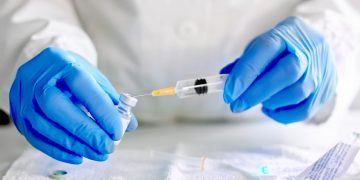Peter Kolchinsky in City Journal:
 The biopharmaceutical industry will be able to make a Covid-19 vaccine— probably a few of them—using various existing vaccine technologies. But many people worry that Covid-19 will mutate and evade our vaccines, as the flu virus does each season. Covid-19 is fundamentally different from flu viruses, though, in ways that will allow our first-generation vaccines to hold up well. To the extent that Covid does mutate, it’s likely to do so much more slowly than the flu virus does, buying us time to create new and improved vaccines. Every virus has a genome composed of genetic material (either RNA or DNA) that encodes instructions for replicating the virus. When a virus infects a cell, it accesses machinery for making copies of its genomic instructions and follows those instructions to make viral proteins that assemble, with copies of the instructions, to form more viruses (which then pop out of the cell to infect new cells, either in the same host or in someone new). There is a critical difference between coronaviruses and flu. The novel coronavirus genome is made of one long strand of genetic code. This makes it an “unsegmented” virus—like a set of instructions that fit on a single page. The flu virus has eight genomic segments, so its code fits on eight “pages.” That’s not common for viruses, and it gives the flu a special ability. Because the major parts of the flu virus are described on separate pages (segments) of its genome, when two different flu viruses infect the same cell, they can swap pages.
The biopharmaceutical industry will be able to make a Covid-19 vaccine— probably a few of them—using various existing vaccine technologies. But many people worry that Covid-19 will mutate and evade our vaccines, as the flu virus does each season. Covid-19 is fundamentally different from flu viruses, though, in ways that will allow our first-generation vaccines to hold up well. To the extent that Covid does mutate, it’s likely to do so much more slowly than the flu virus does, buying us time to create new and improved vaccines. Every virus has a genome composed of genetic material (either RNA or DNA) that encodes instructions for replicating the virus. When a virus infects a cell, it accesses machinery for making copies of its genomic instructions and follows those instructions to make viral proteins that assemble, with copies of the instructions, to form more viruses (which then pop out of the cell to infect new cells, either in the same host or in someone new). There is a critical difference between coronaviruses and flu. The novel coronavirus genome is made of one long strand of genetic code. This makes it an “unsegmented” virus—like a set of instructions that fit on a single page. The flu virus has eight genomic segments, so its code fits on eight “pages.” That’s not common for viruses, and it gives the flu a special ability. Because the major parts of the flu virus are described on separate pages (segments) of its genome, when two different flu viruses infect the same cell, they can swap pages.
Imagine two people with eight-page reports fighting over a copy machine. In the tussle, some copies might turn out to have a mix of pages from two different reports. This page-swapping process, where viruses exchange parts of their genome, is called reassortment. The flu can change rapidly when multiple strains pass through the same host. But coronavirus, as a one-page report, tends to stay together, and while coronaviruses can swap sections—in a process known as recombination—it is difficult to achieve and thus rare. (Imagine two pages ripping in the same way and swapping pieces that get glued together again.)
More here.
